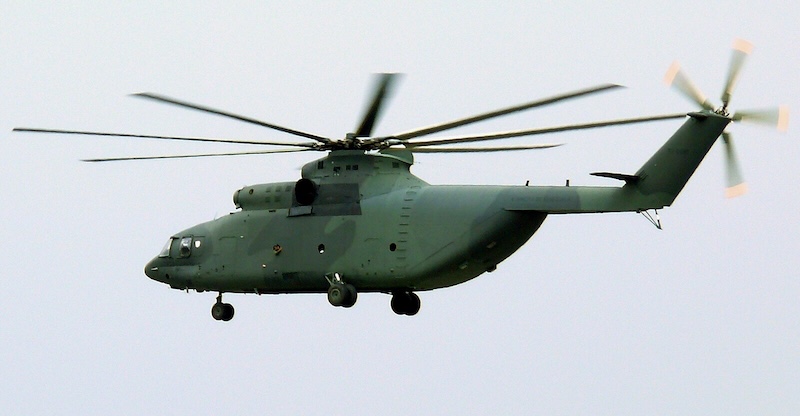Mi-26 Halo
Summary
| Category | Military Helicopters |
| Origin country | 🇨🇳 Ex-USSR |
| Manufacturer | Mil |
| First flight | 14 December 1977 |
| Year introduced | 1983 |
| Number produced | 316 units |
| Average unit price | $90 million |
Description
Following the incomplete development of the heavier Mil Mi-12 in the early 1970s, work began on a new heavy-lift helicopter, designated as the Izdeliye 90 and later designated Mi-26. The new design was required to have an empty weight less than half its maximum takeoff weight. The helicopter was designed by Marat Tishchenko. The Mi-26 was designed to replace earlier Mi-6 and Mi-12 heavy lift helicopters and act as a heavy-lift helicopter for military and civil use, having twice the cabin space and payload of the Mi-6. The primary purpose of the Mi-26 was to transport military equipment to remote locations after delivery by military transport aircraft. The first Mi-26 flew on 14 December 1977, and the first production aircraft was rolled out on 4 October 1980. Development was completed in 1983, and by 1985, the Mi-26 was in Soviet military and commercial service.
The Mi-26 stands out as the first factory-equipped helicopter to feature a single, eight-blade main lift rotor, incorporating an engine load sharing system that allows for continued flight even with the failure of one engine, contingent upon the aircraft's mission weight. While its empty weight is only marginally greater than that of its predecessor, the Mi-6, the Mi-26 boasts a payload capacity of up to 20 tonnes (44,000 lb). The tail rotor possesses a diameter and thrust comparable to the four-bladed main rotor of the MD Helicopters MD 500. The helicopter's main gearbox, while relatively lightweight at 3,639 kg (8,023 lb), is capable of absorbing 14,700 kilowatts (19,725 shp), achieved through a non-planetary, split-torque design incorporating quill shafts for torque equalization.
The Mi-26 is primarily designed for transporting heavy military equipment and cargo. It can carry up to 20,000 kg (44,000 lb) of cargo internally or externally. It can transport military equipment such as 13-tonne amphibious armored personnel carriers and mobile ballistic missiles. The helicopter is not explicitly equipped with offensive weaponry, as its primary role is transport.
The Mi-26 has seen extensive operational use in both military and civilian roles across the globe. In the Soviet era, it was notably deployed for disaster response, including the Mi-26S variant used during the Chernobyl nuclear accident in 1986, where it was instrumental in radiation measurements and precision drops of insulating material. A civilian Mi-26 was employed to recover a 23-tonne frozen block encasing a woolly mammoth in Siberia in 1999. In early 2002, a civilian Mi-26 was leased to the U.S. Army to recover two MH-47E Chinook helicopters from a mountain in Afghanistan. A Mi-26 was used in China to bring heavy earth moving tractors to the quake-lakes at Tangjiashan mountain after the Wenchuan earthquake in 2008. Russian Mi-26 helicopters were involved in troop transfer operations during the 2022 Russo-Ukrainian War. The operational history includes incidents such as the 2002 Chechnya shoot down of an overloaded Mi-26 by a surface-to-air missile, the downing of a Moldovan Mi-26 in Afghanistan in 2009, and the crash of an Indian Air Force Mi-26 in 2010. The Mi-26 has been operated by various air forces, including those of Algeria, China, and Russia, as well as by civil operators like UTair Aviation, with some nations like India retiring their fleets.
Main Variants:
-
Mi-26: The original military cargo/freight transport version, identified by the NATO reporting name 'Halo-A'.
-
Mi-26A: An upgraded military variant featuring a new flight/navigation system, though it did not enter production after its initial flight in 1985.
-
Mi-26M: An enhanced version of the Mi-26, equipped with ZMKB Progress D-127 engines to deliver improved performance.
-
Mi-26T: The basic civil cargo/freight transport version, which began production in 1985.
-
Mi-26T2V: A modernized variant for the Russian military, equipped with a new NPK90-2V avionics suite enabling automatic route flying, the "Vitebsk" airborne defense complex, and enhanced cockpit features for night operations.
Technical specifications
| Version: Mi-26T | |
|---|---|
| Crew | 5 members |
| Operational range | 590 km (367 mi) |
| Maximum speed | 295 km/h (183 mph) |
| Height | 8.1 m (26.7 ft) |
| Length | 40.0 m (131.3 ft) |
| Service ceiling | 4,600 m (15,092 ft) |
| Empty weight | 28,000 kg (61,729 lbs) |
| Max. takeoff weight | 56,000 kg (123,459 lbs) |
Current operating countries
| Country | Units | ||
|---|---|---|---|

|
Russia | 45 (+15) | |

|
Algeria | 14 | |

|
Jordan | 4 | |

|
North Korea | 4 | |

|
Belarus | 3 | |

|
Venezuela | 3 | |

|
Kazakhstan | 2 | |

|
Burkina Faso | 1 | |
| 🇨🇩 | Congo Democratic Republic | 1 | |
| 🇬🇶 | Equatorial Guinea | 1 | |
All operators


